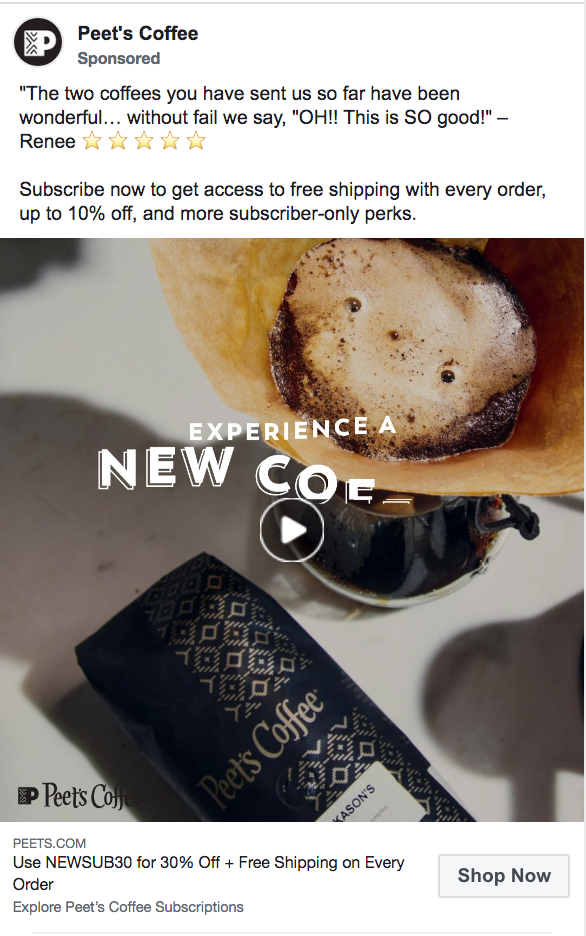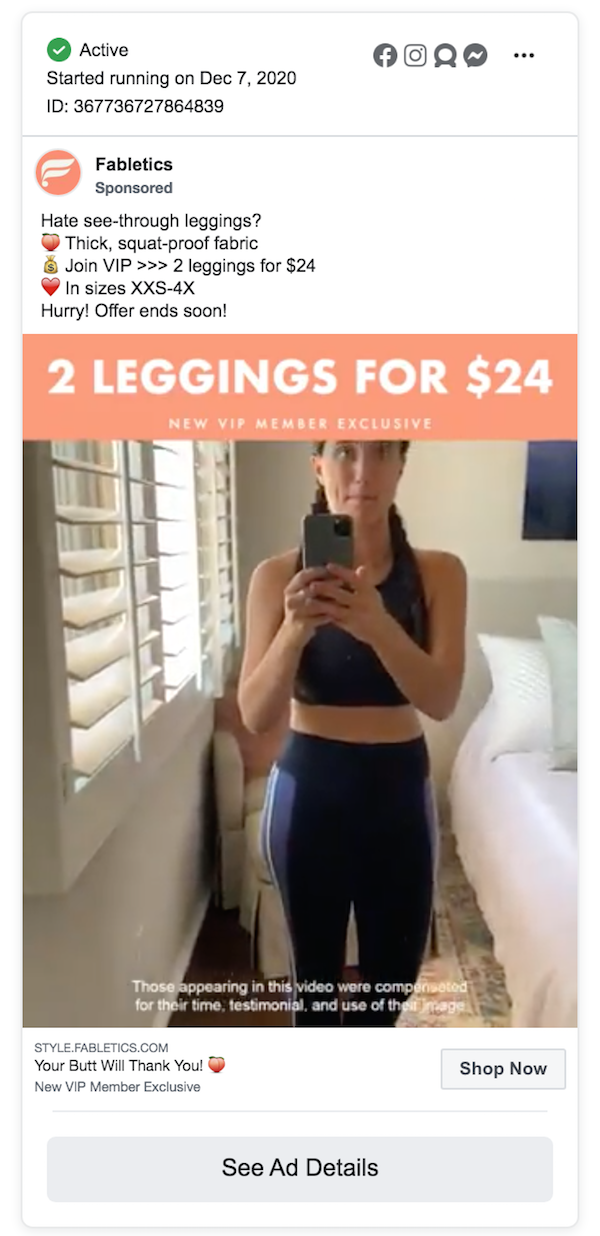How to Leverage Testimonial Examples in Paid Campaigns

No matter how creative and convincing your marketing can get, when you are trying to sell to someone, they sense they are being sold to. Maybe they are primed for that sale and ready to buy, or maybe not.
On the flip side, someone telling a story about their experience with a brand and recommending it is a lot more convincing, especially when they aren’t paid to do it.
Testimonial examples can boost the social proof in your paid ad campaigns, adding authenticity to your online marketing. Adding recommendations from your customers or clients into your digital ads can help them stand out from the competition, stop people from scrolling by, and encourage users to click through to learn more about your brand.
Why Are Testimonial Examples Important in Paid Ad Campaigns?
There are many considerations when you are building paid ad campaigns: images, text on the images and in the copy, calls to action (CTAs), URL, click-through landing page, and more.
With all these constraints and necessities, you may be tempted to lean into the direct sell as you build your paid ad campaign. You may want to get to the heart of things and tell people why you are amazing and why they should buy (and where).
There are also a lot of reasons to slow down and think about incorporating testimonial examples into your paid ads.
Below are four reasons to incorporate customer reviews in your paid campaigns.
1. Testimonial Examples Improve Credibility
Whether your product works better than anyone else’s, or your prices just can’t be beaten, a skeptical customer is always going to wonder if it’s too good to be true when they see your ad. If they haven’t heard of you, they may wonder what you’re all about.
They might click to read more and explore, but maybe they’ll just assume you aren’t legit and keep scrolling past your ad.
Testimonial examples can change all that by adding credibility to your ad and your brand. Suddenly, there’s some proof you’re worth it.
2. Testimonial Examples Set the Stage for Great Customer Relationships
Customer service is a critical element for many buyers. In fact, Microsoft reports that as many as 90 percent of consumers consider customer service when thinking about working with a company.
It’s not just about a good product at a reasonable price; customers want to know they will be supported if they have questions about your product or service.
Testimonial examples give you a chance to share happy customers’ best experiences. They can speak to the customer service they interacted with or the overall experience working with your brand. This can help make potential customers feel more confident in their decision to use your brand.
3. Testimonial Examples Show Authenticity
People feel sold to all day and are always on the lookout for real authenticity. An Edelman report shows that nearly three-quarters of consumers actively try to avoid ads.
Testimonial examples give you the chance to tell real stories about real experiences. People love hearing stories, and when they feel connected to them, they may be more emotionally inclined to work with you.
4. Testimonial Examples Increase Conversions
While all the above reasons are great psychological reasons for using testimonials in your paid campaigns, at the end of the day, your marketing is about making more sales for your brand. Your paid ads should be designed to convert.
When people feel more confident about your offerings and feel an authentic connection with your brand, they are more likely to click through your ad and get to your landing page or website. From there, they are more likely to learn more and eventually make that sale. In fact, a VWO study found that using testimonials increased sales by 34 percent.
When it comes down to it, one of the best reasons to add testimonial examples to your ads is to make more sales.
How to Use Testimonial Examples in Paid Ads
Is it time to start incorporating testimonial examples into your paid ads? There are different ways to do this, but let’s talk about the high-level considerations for getting those testimonials into your ads.
1. Incorporate High-Quality Images
A photo of your product or people interacting with your product (with a quote incorporated in it) is a great way to get started with testimonials in your ads.
Make sure you use a high-quality image with a testimonial quote that is short and easy to read and grabs a buyer’s attention quickly. You want people to “get it” immediately.
Another way to use images to showcase your testimonials is a screenshot of reviews or star ratings from your website. Again, make sure you have the highest quality image you can so buyers don’t strain to read or struggle to understand what you’re trying to convey. Keep it simple.
More about this below, but remember to make sure you have legal rights to the reviews you are sharing. You can’t just go and copy them from anywhere without the consent of the reviewer.
2. Experiment With Different Formats
Testimonials from your happy customers can come in a lot of different formats. They might be text quotes, full case studies, or video testimonials.
As you build your marketing campaign funnel, you can experiment with different formats and integrate different types of testimonial examples throughout the various touchpoints of your ads.
For instance, you can use a simple, short quote in the images or text of your digital ads. That introductory text should really deliver a punch such as “This product changed my life” or “I couldn’t do my work without this service.”
You may want it to be pithy and draw the readers’ attention so they are interested in reading more.
You could also use video interviews or testimonials from customers or clients who love what you do. Even as these are more interactive and engaging, they should still be short and sweet, grabbing the viewers’ attention quickly.
3. Decide What Narrative You Want to Share
Carefully consider what kind of story you want your testimonial examples to share. Of course, they should be positive endorsements, but you will want to figure out the angle you want your testimonials to take.
They should be more nuanced than just “it’s a great product” or “you should buy it.”
Make sure your testimonial examples are framed around a compelling reason. Why is your product different from others? Why are your happy customers actually happy? Why would they want to tell others?
Imagine your customers talking to their best friends. What’s the reason they endorse your product? What brought it up in their conversation in the first place, and why are they excited to talk about it?
Especially if you decide to try some A/B testing or a variety of ad types to see what works best, building all your ads around a single narrative can help keep everything cohesive, improving the chances you connect with and convert your customers.
4. Make It Conversational
Testimonial examples in your ads can be a way to engage with your customers rather than just speaking at them. Keeping the tone of the ad approachable and conversational can add to the authentic nature of your message.
Maintaining a human touch is the key to this kind of message. Make sure it sounds like friends talking together, not a keynote presentation or a car salesperson.
One way to do this is to incorporate user-generated content, such as videos or photos. This kind of content brings honesty and a genuine feel to your ads.
Be careful to watch that narrative, as we discussed above, to ensure your message isn’t muddled. By setting those parameters for the message you are trying to convey, you can filter which user-generated content will be best for your paid ads.
5. Lead From the Ad to the Page
Keep the whole customer journey in mind as you put together your paid campaign using your testimonial examples. Remember that it’s not just about the ad; it’s about where they go next and what they will do once they get there.
You can use your ad to build intrigue and interest, then continue that story on the page you send them to.
Start with a short testimonial quote, an image of the customer sharing the testimonial, a quick video clip, or another snapshot that is going to get people interested.
Maybe it starts with a question such as, “How did this product change my life?” Perhaps it contains the first part of a testimonial and includes a CTA to tell the reader to click to hear the rest.
Your next step is to deliver. On the page, make sure you tell the next part in written text, graphics, a longer video, or a case study.
Don’t forget to make it easy to close the sale by including a buy link or another way to capture their information.
6. Don’t Overlook the Legalities
There are a lot of legal regulations surrounding how you use testimonials. This isn’t legal advice, and you should consult an attorney if you have specific questions. However, there are a few things to consider as you use testimonials in your ads.
- Make sure you have permission from the people whose testimonials you are using. Don’t just cut and paste a great review you find out there.
- Reach out and make sure the customer gives you written permission to use the review for marketing purposes. You can also include this information on your website or other places you are collecting reviews so customers aren’t surprised, but you should still get that permission.
- Ensure your testimonials are accurate and typical for most buyers. In other words, don’t exaggerate or oversell using testimonials. Let’s be honest: this isn’t just about the legalities. It’s also the right thing to do. Your testimonials should be about honesty and authenticity.
2 Great Testimonial Examples
Are you still wondering what testimonial examples look like in a paid campaign? Here are a couple of examples to get you started:
Peet’s Coffee

Using a real review from a user of their coffee subscription services, this Peet’s Coffee Facebook ad catches your eye with its simplicity and the star bar.
It puts a positive review of the subscription service right in front of you. The review retains a bit of authenticity as well with the exclamations and random capitalizations. It isn’t “cleaned up,” so to speak.
The rest of the ad continues with specifics about the services and a quick video overview. Starting with the review, it draws you in to learn more about what makes Renee so happy.
Fabletics

This Fabletics Facebook ad showcases a series of quick testimonial video snippets from happy wearers of their products. It’s instant proof these pants do what they’re advertised to do. They also show people actually wearing the pants, which is an added layer of authenticity.
You’ll notice the line on the bottom of the video that reminds people these people were compensated for the use of their reviews.
Conclusions
As you gather reviews from your customers, it may be time to start thinking about how you can incorporate them into your paid ad campaigns. Paid internet advertising can help you find your ideal audience and connect your brand with what your audience is looking for.
By setting up testimonial ads, you can bring social proof and realness to your brand, encouraging your audience to click to learn more and convert to customers.
Creating and maintaining your paid campaigns may be overwhelming to some. If that’s true for you, we can help. Our team of experts specializes in paid ads, as well as SEO and content marketing.
How will you be using testimonial examples in your next paid ad campaign?
from Neil Patel https://ift.tt/2R8joix
No comments